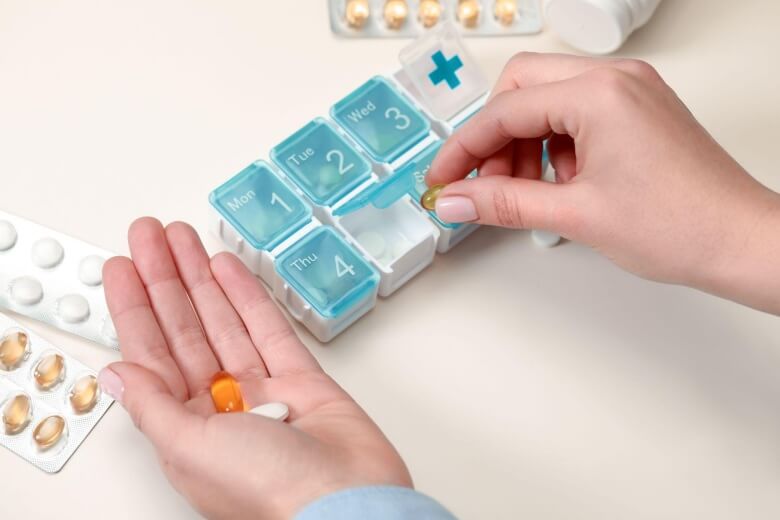Highlights
- Citalopram (Celexa) is an antidepressant belonging to a class of drugs called SSRIs.
- This medication is generally used to treat major depressive disorder (MDD) but may also help with anxiety, panic disorders, and other conditions.
- All antidepressants carry a risk of suicidal thinking and behaviors in children, teens, and young adults.
- This antidepressant is available in liquid, tablet, or capsule form.
- Citalopram is generally safe, but certain individuals should not take this medication or proceed with caution.
- BidRx helps you get the lowest price on citalopram.
The stigma around depression and other mental health conditions is waning, providing hope for those who have suffered in silence. One option to improve depressive symptoms is to take a prescription antidepressant, such as citalopram (also known as Celexa).
In 2021, there were more than 18.4 million prescriptions for citalopram. This medication is generally safe, but it might not be suitable for certain individuals. Also, understand that no medication is without side effects and potential interactions with other medications.
Here’s what you need to know about citalopram, including its uses, how it works, potential side effects, formulas, dosages, and other important information.
What Is Citalopram and What Is It Used For?

Citalopram, also sold under the brand name Celexa and others) is an antidepressant belonging to a drug class known as selective serotonin reuptake inhibitors (SSRIs). Citalopram and other SSRIs work by increasing the amount of serotonin in the brain.
It’s primarily used to treat major depressive disorder (MDD) and other mood disorders. Off-label uses include:
- Anxiety
- Panic disorders
- Obsessive-compulsive disorder (OCD)
- Premenstrual dysphoric disorder (PMDD)
Citalopram was developed in the 1970s as part of a broader effort to selectively target the serotonin system in the brain, which could lead to improvements in mood without affecting other neurotransmitters. The medication gained FDA approval in 1988.
Like other antidepressants, citalopram comes in generic and name-brand options. Other names for citalopram include:
- Celexa
- Celepram
- Celica
- Akarin
How Does Citalopram Work?
Citalopram works like other SSRIs. Its mechanism of action influences the levels of serotonin, a neurotransmitter in the brain responsible for mood.
Serotonin is released in the brain to transmit signals between neurons. After release, some of the serotonin is reabsorbed by the neuron that released it, a process called reuptake.
Citalopram and other SSRIs inhibit reuptake, allowing more serotonin to remain in the brain. The increased concentration of serotonin is thought to enhance mood and positive feelings.
Citalopram Dosage and Administration
Citalopram comes in varying strengths and forms, including:
- Tablets containing 10 milligrams, 20 milligrams, or 40 milligrams
- Capsules containing 30 milligrams
- Oral liquid solution containing 10 milligrams per 5 milliliters
This medication is typically taken once per day, usually around the same time each day. Starting doses and ongoing regimens vary depending on the person’s age, diagnosis, and other factors. Your healthcare provider may increase the dosage once you adjust to the medication. Doses over 20 milligrams are generally not prescribed for patients aged 60 or older.
Note that the dosage regimens above are general guidelines. Individual circumstances and doctor discretion may influence appropriate dosage.
How Should I Take Citalopram?

Citalopram can be taken with or without food. If taking citalopram results in an upset stomach, try taking it with food. Take this medication on a consistent schedule to maintain medication levels in your bloodstream.
If you’re taking the tablet or capsule form of this medication, swallow the medication whole. Never crush, chew, or break the medication unless your healthcare provider instructs you to do so.
If you are taking the liquid form of this medication, remember to shake the bottle prior to dispensing each dose.
Don’t stop this medication abruptly. Withdrawal symptoms due to the sudden discontinuation of citalopram or other SSRIs may occur. If you’re considering discontinuing citalopram, your doctor can provide guidance to help you gradually taper use.
Always follow the specific instructions given by your healthcare provider or pharmacist.
What Are the Potential Side Effects of Citalopram?
No medication is without side effects. Similar to other antidepressants, citalopram may increase suicidal thinking or actions in adolescents and young adults.
No list of side effects is complete. However, common side effects when taking citalopram may include:
- Nausea
- Sleepiness
- Weakness
- Dizziness
- Sweating
- Low appetite
- Dry mouth
- Constipation
- Diarrhea
- Decreased libido
- Impotence
- Trouble sleeping
Less common but more serious side effects may occur. These include:
- Suicide attempts
- Dangerous impulses
- Abnormal behavior
- New or worsening depression
- Unusual changes in behavior or mood
- Panic attacks
- Acts of aggression or violence
- An increase in talking or activity
- Feelings of agitation
- Serotonin syndrome
- QT prolongation
- Severe allergic reactions
- Vision problems, such as eye pain or changes in vision
Serious side effects should be reported to your doctor immediately. Contact your healthcare provider if you have any concerns or questions about side effects.
What Should I Avoid When Taking Citalopram?
As with any medication, there are certain precautions and considerations to keep in mind. In general, individuals taking citalopram should take the following precautions:
- Use caution when driving. Citalopram can increase drowsiness, which may impact your ability to make decisions, react quickly, or think clearly. Do not drive or operate heavy machinery until you know how citalopram will affect you.
- Do not drink alcohol when taking citalopram. Alcohol may increase the medication’s sedative effects, leading to increased drowsiness and impaired judgment.
- Avoid sunlight when possible. SSRIs, including citalopram, can increase sun sensitivity in some individuals.
Your doctor may provide other recommendations based on your dosage and other conditions.
What Should I Do If I Miss a Dose of Citalopram?
If you miss a dose of citalopram, take it as soon as possible unless it is almost time for your next dose. In this case, skip the missed dose and then resume your normal dosing schedule.
Never double up on doses, as this can lead to too much of the active ingredient in the bloodstream.
What Should I Do If I Overdose on Citalopram?
It is possible to overdose on citalopram. Never take more than the prescribed amount of this medication.
If you believe you or another individual has overdosed on citalopram, call 911 and seek medical attention immediately.
What Precautions Should I Take With Citalopram?

Citalopram comes with the following precautions and recommendations:
- Allergic reactions may occur. Inform your doctor and pharmacist about any allergies to citalopram, escitalopram, or any other medications, and check the Medication Guide for ingredients.
- Avoid MAOIs and pimozide. Notify your doctor if you are taking pimozide or an MAOI inhibitor within the past 14 days, as combining these with citalopram can be dangerous.
- Avoid taking citalopram with escitalopram. Taking both medications concurrently is not recommended.
- Some supplements may interact with citalopram. Inform your doctor about all medications, including prescription and nonprescription drugs, vitamins, and herbal supplements, due to potential interactions. Disclose the use of nutritional supplements and herbal products, especially those containing St. John’s wort or tryptophan.
- Report your family medical history to your doctor before taking this medication. Report alcohol consumption, substance use history, and any family history of long QT syndrome, heart conditions, high blood pressure, bleeding problems, strokes, low electrolyte levels, seizures, or kidney/liver disease.
- Citalopram may impact newborns or developing fetuses. Inform your doctor if you are pregnant, plan to become pregnant, or are breastfeeding, as citalopram may have implications for newborns if taken during the last months of pregnancy.
- Citalopram may cause drowsiness and affect judgment, thinking, and movements. Avoid driving or operating machinery until the medication’s effects are understood.
- Discuss the safe use of alcoholic beverages with your doctor. Alcohol can exacerbate citalopram’s side effects.
- Understand that citalopram may cause angle-closure glaucoma. Consider an eye examination before starting the medication and seek medical attention for specific eye symptoms.
Always consult with your healthcare provider for personalized advice and to address any concerns related to your specific health condition.
Contraindications
Some people should not take citalopram. Others should use it with caution under close medical supervision.
Keep in mind that these lists are general guidelines. In special cases, doctors may feel the benefits of taking a particular medication outweigh the risks, so if you are in one of these groups, talk to your doctor about your personal situation.
Who Should Not Take Citalopram?
Citalopram isn’t recommended for patients who:
- Are allergic to the medication or any of its components
- Are taking an MAOI or have stopped taking an MAOI within the past 14 days
- Have a heart problem, including congenital long QT syndrome
- Are taking pimozide, an antipsychotic medicine
Who Should Take Citalopram With Caution?
Tell your doctor if any of the following apply to you, as there may be special considerations and precautions to know before taking citalopram.
- You have liver, kidney, or heart problems
- You have a history of seizures
- You have bipolar disorder or mania
- You have hypertension (high blood pressure)
- You have low sodium levels
- You are pregnant or planning to become pregnant
- You are currently breastfeeding or plan to breastfeed
- You have or have had bleeding problems
- You have had a stroke
Are There Any Other Potential Drug Interactions With Citalopram?

Citalopram has a range of known drug interactions, so consult your doctor for personalized advice.
However, here’s a summary of some common interactions.
Major Interactions
- Monoamine oxidase inhibitors (MAOIs): Combining these with citalopram can lead to serotonin syndrome, a potentially life-threatening condition. Avoid MAOIs within 14 days of taking citalopram.
- Other antidepressants: Taking other antidepressants with Citalopram can increase the risk of serotonin syndrome. Inform your doctor of all antidepressants you’re using.
- Pimozide: This antipsychotic medication can have dangerous interactions with Citalopram and should be avoided while taking it.
Other Notable Interactions
- Nonsteroidal anti-inflammatory drugs (NSAIDs): These can increase the risk of bleeding when taken with citalopram. Monitor for signs of bleeding and consult your doctor if you have any concerns.
- Blood thinners: Citalopram can increase the risk of bleeding when taken with blood thinners like warfarin (Coumadin). You may need close monitoring and dosage adjustments.
- St. John’s wort: Avoid St. John’s wort while you’re taking citalopram. This herbal supplement can lead to serious side effects.
- Alcohol: Limit or avoid alcohol while you’re taking this medication. It can increase the sedative effects of citalopram and impair judgment.
- Triptans (migraine medications): These can increase the risk of serotonin syndrome. Inform your doctor if you take triptans.
This is not an exhaustive list, and many other drugs can interact with Cymbalta. For a complete list of known potential interactions, see the Drugs.com Drug Interactions Checker.
Let your provider know if you experience any new or unusual symptoms after starting this medication.
Choosing Citalopram to Ease Depression
Citalopram is a popular antidepressant that can help individuals with depression lead more productive lives. However, this medication can also have serious side effects, so it’s important to be well informed about its uses, side effects, and potential interactions.
Now that you’ve taken the time to educate yourself, whether you’re taking citalopram for major depressive disorder or an off-label use, the next step is to get your citalopram prescription at a price that fits your budget.
Get the Lowest Price for Citalopram With BidRx
BidRx makes it easy to find prescription medications like citalopram for the lowest price. Create a free account, place your bid, and let pharmacies send you their best offer. You’ll get your prescriptions delivered to your door and save money, too.
Get started today with a free BidRx account.
This information is intended for general informational purposes only. It is not a substitute for professional medical advice, diagnosis, or treatment. Always seek the advice of your physician or other qualified health provider with any questions you may have regarding a medical condition or medication.
